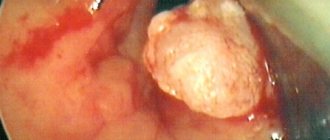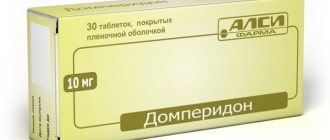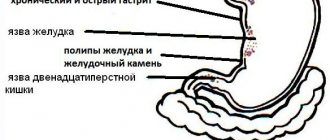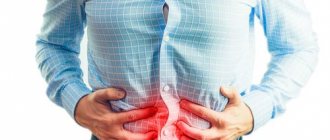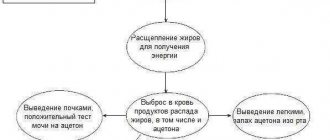Causes of burning
A burning sensation in the stomach, esophagus or throat can be caused by pathological processes in organs, abuse of a number of foods, and bad habits. If the burning sensation is caused by the consumption of foods, it is enough to simply exclude them from the diet. But sometimes the cause of discomfort is a serious pathology, then a thorough diagnosis and urgent treatment are necessary.
Heartburn
A common phenomenon among the adult population, in which gastric juice enters the esophagus. Mild discomfort is not a cause for concern; it means that you need to reduce the load on the gastric tract by eliminating harmful foods.
Periodic heartburn occurs in obese people who eat spicy foods. Stressful situations and bad habits provoke the symptom. During pregnancy, the symptom occurs in most women in the third trimester, if the fetus is large and puts pressure on the stomach. Some girls experience heartburn for the first time only when they are pregnant. This phenomenon does not indicate pathologies of the gastrointestinal tract and goes away after the birth of the baby.
Heartburn is caused by:
- Stressful situations.
- Physical activity after meals.
- Medications.
- Fatty, sour, spicy foods.
- Lying down after eating.
Severe heartburn often occurs after alcohol and overeating. If you eat before going to bed, the disorder occurs at night, and in the morning after heartburn, a person has a sour taste and bad breath.
Additional clinical manifestations
Common signs of diseases are:
- frequent belching;
- burning after eating;
- attacks of nausea;
- vomit;
- a burning sensation occurs at the back of the chest;
- a feeling of sour or bitter taste in the mouth;
- bad breath.
When the pathology develops, along with a burning sensation, a coating on the tongue is observed. The taste organ is covered with a dense layer of secretion, which has a white-gray color. Due to the inflammatory process, increased salivation occurs. The patient complains of general weakness and malaise. In some cases, fever appears.
In addition to general symptoms, there are features of discomfort. If it burns in the throat and esophagus, then the sensation is divided into degrees of manifestation. There is slight discomfort, which rarely occurs. The burning intensity is weak and passes quickly. During the middle course, the burning sensation behind the sternum appears once. If you do not provide first aid, then an exacerbation occurs. When the burning sensation is severe, the discomfort does not go away for a long time. This symptom is repeated constantly after exposure to an irritating factor.
The last degree of burning can develop into possible complications. In this case, the following signs are distinguished:
- bleeding in the esophagus;
- breathing and swallowing problems;
- constant bad breath.
These clinical manifestations indicate the development of cancer in the digestive organ. Otherwise, a severe degree of inflammation occurs in the esophagus. If a patient has reflux esophagitis, then the bad breath has a sour or bitter taste.
If a slight burning sensation occurs during pregnancy, it is often associated with poor nutrition and routine. This is due to changes in hormonal levels. This symptom occurs in children due to the underdevelopment of the digestive system.
Burning in the stomach
Many people experience the symptom without realizing that a burning sensation in the stomach (but not heartburn) can be caused by serious illnesses. The causes of the painful sensation in the stomach that occurs before or after eating should be determined by a gastroenterologist. Serious pathologies of the digestive tract provoke the appearance of symptoms.
Often the sensation occurs when the integrity of the gastric mucosa is violated, when hydrochloric acid and other aggressive substances act on the walls of the organ.
Stomach ulcer
With this disease, the integrity of the mucous membrane of the organ and the tissues located underneath it is compromised. A person experiences severe pain an hour after eating or on an empty stomach, there is heartburn, a feeling as if a foreign body is stuck in the larynx, belching, nausea and vomiting. After vomiting, relief comes. An ulcer can cause severe stomach pain due to emotional distress, as the condition causes a disruption of motility and secretion.
Peptic ulcer disease requires treatment, which can lead to complications such as bleeding or gastric perforation. Antacids do not help with ulcers.
Gastritis
With gastritis, inflammatory-dystrophic changes in the gastric mucosa are observed. The pathology is common and occurs among all age groups. The disease is provoked by infection, taking antibiotics, poor nutrition, and mechanical damage during research.
A person experiences abdominal pain, nausea, vomiting, and heartburn. When there is bleeding, the stool becomes dark in color.
Poor nutrition
Often a burning sensation in the stomach is present after eating. Eating certain foods can irritate nerve endings. It is especially acute when overeating, excessive consumption of alcohol, spices, and smoked foods. The occasional occurrence of heartburn may indicate that your diet needs adjustment. In order for the organ to function properly, alcohol should be completely eliminated.
Treatment: how to eliminate burning sensations?
man in bathrobe with medication in paper cup
To alleviate the condition, doctors often prescribe several types of drugs. They should be taken strictly according to the instructions, since an overdose can cause unpleasant side effects. If such medications do not help relieve symptoms, it is important to see a gastroenterologist to conduct a diagnosis and find out the exact cause of the ailment.
Treatment of heartburn and burning sensations in the upper parts of the digestive system is carried out with the following groups of drugs:
- Antacids . Neutralizes increased stomach acidity. Sometimes they can cause diarrhea or constipation.
- Foaming agents . Prevent reflux by protecting the esophageal tract from acid penetration and food reflux.
- H2 blockers . Reduce the secretion of hydrochloric acid and temporarily relieve symptoms.
- Proton pump inhibitors . Eliminate signs of reflux-esophagitis and are able to restore damaged or inflamed mucosa.
- Prokinetics. Strengthen the sphincter, speed up the digestion of food in the stomach. They are capable of blocking physical activity and inhibiting the nervous system.
These groups of drugs suppress acid production, but do not treat the disease if it is caused by infection or other factors. They are suitable in cases where the patient needs to adjust their diet. But even with gastritis or ulcers, dietary products will have a beneficial effect on health and can cure the disease.
Burning in the esophagus
A burning sensation in the esophagus is often caused by heart or lung disease. Often the esophageal canal burns during pregnancy.
Often provoked by various factors:
- Infection with pathogenic bacteria that produce toxins.
- Infectious diseases of the oropharynx, in which the virus affects the esophagus.
- Accidental or intentional ingestion of chemicals - alkalis, acids.
- Mechanical damage from a probe or other foreign object.
- Eating spicy food.
- Food allergies.
Discomfort in the esophagus can be caused by diseases of the stomach or other organs of the tract. Oncological diseases, inflammation of the pancreas, cholelithiasis cause heaviness in the esophagus area.
Esophagitis
The probable cause of the burning sensation may be esophagitis, a pathology of the esophagus in which its mucous membrane becomes inflamed. When a person gets sick, it becomes difficult to swallow, his throat and chest hurt. Frequent and extremely severe heartburn, a lump is felt in the throat, a burning sensation in the larynx.
Pathology develops due to chemical burns, bacteria, and mechanical damage. But the most common cause of the disease is gastroesophageal reflux. Esophagitis has two forms: acute and chronic. In the acute form, the patient experiences pain when passing food, and there is increased salivation.
Chronic esophagitis develops due to prolonged consumption of spicy food or alcohol. The pathology is characterized by pain in the sternum after eating or not associated with food. Constant heartburn occurs in the evening or at night.
Treatment
The basis of treatment is usually strict diet correction and elimination of the provoking factor. Diet therapy involves eliminating spicy, fatty, hot dishes from the daily menu, which cause hypersecretion of gastric juice, which negatively affects the course of the pathology.
Meals should be at regular intervals and in small portions. And after eating, you should not lie down to prevent acid from refluxing into the esophagus. If burning esophageal discomfort occurs due to errors in nutrition, then diet therapy will help cope with this problem.
If burning symptoms in the esophagus have a pathological origin, drug therapy cannot be avoided; it is aimed at eliminating the provoking factor.
- If the causes are related to gastrointestinal pathologies, then the pH balance in the digestive system will need to be restored. Medicines are prescribed by a specialist according to the disease.
- If the burning sensation in the esophageal canal is of allergic origin, antihistamines are prescribed, and contact with the allergen must be completely avoided. Cetirizine, Tavegil, Zyrtec, Claritin, etc. are prescribed.
- If the burning sensation is caused by infectious lesions, then treatment is prescribed depending on the disease. Rotavirus infection is treated by taking antibiotics. If a sore throat bothers you, then treatment is supplemented with topical agents such as Doctor Mom sprays or lozenges, Strepsils, etc.
Also, depending on the specific cause of the pathological burning sensation, patients may be prescribed analgesic and antacid, astringent or enveloping medications.
If esophageal burning occurs, patients should seek appropriate help from a gastroenterologist or therapist. Although in most cases the causes of burning are not fatal, sometimes a similar symptom occurs against the background of malignant or advanced ulcerative processes that require immediate treatment.
Burning throat
The symptom often occurs unexpectedly and does not always indicate a disease. It is often observed in people working with free-flowing, volatile substances or in rooms with heavy smoke. Heartburn in the throat appears due to various diseases of the upper respiratory tract and larynx.
Respiratory diseases
A burning sensation in the throat may be accompanied by respiratory diseases, for example:
- Tonsillitis is inflammation in the tonsil area. May be manifested by an increase in temperature. While eating, the patient has difficulty swallowing. The disease is contagious, the patient is able to spread the infection to others before signs of the disease appear.
- Laryngitis is an inflammatory disease of the laryngeal mucosa, in which a person may develop a strong, incessant cough, the throat burns and turns red.
- Tracheitis is an inflammatory process of the trachea and mucous membrane; in the patient, pain in the larynx moves to the chest area. A dry cough may occur at night, causing the throat to feel like it's on fire.
- Pharyngitis is an inflammatory process in the mucous membrane of the pharynx. It affects not only the mucous membrane, but also deeper tissues.
With diseases of this kind, a person has a sore and burning throat, the temperature rises, a coughing attack is often observed, and severe pain is felt when swallowing.
Neuralgia
Damage to peripheral nerves can result in various diseases. Pathologies in which the patient feels a burning sensation in the throat:
- Pharyngeal hyperesthesia is increased sensitivity of the mucous membrane. The patient experiences a feeling of a lump in the throat, a constant burning sensation and soreness.
- Paresthesia of the pharynx. The disease is characterized by various sensations in the form of a burning sensation in the upper part of the larynx, soreness, tickling, and numbness of the pharynx. The pathology occurs in patients whose mental state is unstable.
Allergic reactions
Allergies are often accompanied by a burning sensation in the throat. In addition to this symptom, the patient has a cough, itchy nose, and sneezing. If the allergen is near a person, the symptoms intensify. Allergies are often caused by flowering plants and dust.
Neoplasms
With neoplasms of a benign or malignant nature, pharyngeal heartburn occurs. Pathologies that provoke symptoms:
- Malignant tumor of the larynx. With pathology, the patient feels a lump in the throat and difficulty swallowing. My throat is sore, my voice is hoarse.
- With a tumor of the thyroid gland, the patient feels severe squeezing in the throat, burning and pain. Respiration and swallowing gradually become difficult.
- A malignant disease of the mucous membrane is manifested by a burning sensation, difficulty breathing, swallowing, and copious secretion of mucus.
Symptomatic therapy
Episodic heartburn in the throat is often associated with dietary errors, so to relieve it, it is important to properly adjust the diet. To reduce discomfort, it is recommended to radically limit the intake of salty and spicy foods, smoked foods, strong tea and coffee. You need to eat 4-5 times a day in small portions, chewing food thoroughly. In many patients, symptoms completely disappear after quitting smoking and reducing the amount of alcohol consumed.
To reduce the frequency and duration of heartburn episodes, it is advisable to avoid wearing tight belts, corsets and fanny packs. Sleeping on a high pillow can help reduce the likelihood of attacks at night. If a burning sensation in the throat is observed constantly and does not disappear after correcting food habits, this indicates a gastrointestinal disease. Before a clinical diagnosis is established, antacids, proton pump inhibitors, and prokinetics can be used to relieve symptoms.
Diagnosis and treatment
If heartburn occurs rarely, after eating spicy, fatty foods, the phenomenon does not require medical attention. A constant burning sensation accompanied by other symptoms requires careful diagnosis. If you regularly experience a burning sensation in the esophagus, stomach, or throat, you should consult a doctor to find out the cause of the discomfort and to get rid of heartburn.
Diagnostics
Discomfort in the larynx, behind the breastbone or near the stomach can indicate various diseases. At the first stage, it is necessary to find out exactly where the patient feels the burning sensation. The doctor, after talking with the patient, will prescribe an examination to help establish a diagnosis.
To examine the organs of the gastrointestinal tract, the patient is prescribed ultrasound diagnostics and endoscopic examination, during which the walls of the esophagus, stomach and duodenum are examined. During gastroscopy, biological material is taken.
Treatment
The main drug for heartburn that helps eliminate the symptom is an antacid. Medicines have an enveloping effect and eliminate the consequences of acid entering the lumen of the esophagus. You can treat heartburn with Almagel, Maaolox. You can fight heartburn on your own with Venter tablets, if the diagnosis is known. The drug helps if taken 20 minutes before meals.
If an unpleasant feeling in the throat is caused by infectious diseases, gargling with herbal infusions and decoctions will help. Chamomile and sage relieve irritation and help fight infection on the mucous membrane. Rotavirus infections are treated with antibiotics. Sprays and lozenges help relieve the unpleasant sensation.
Pathologies of the gastrointestinal tract cause heartburn - the cause must be eliminated. For gastritis and ulcers, complex treatment is prescribed by a doctor. If there is a burning sensation, take medications that can reduce the secretion of hydrochloric acid.
Your doctor may prescribe enzymes to help with digestion. To restore microflora when taking antibiotics - probiotics.
Antihistamines can help relieve discomfort in the throat caused by allergies. In addition, it is necessary to exclude the allergen.
Traditional methods
You can get rid of heartburn using folk remedies. Regular warm water helps relieve a mild attack, as it restores balance. If the method is ineffective, you can use the following traditional medicine recipes:
- Pour one teaspoon of baking soda into a glass of water and stir. It is not recommended to use the solution frequently, as there is a risk of aggravating the situation.
- Dissolve a teaspoon of aloe juice in a glass of water and drink.
- A strong burning sensation in the esophagus will help relieve honey. It is recommended to slowly eat a spoonful of honey with chamomile tea.
- Potato juice helps get rid of severe heartburn in the larynx. You will have to do it yourself by grating the potatoes and squeezing them through cheesecloth. Drinking 50 ml twice a day will help eliminate belching and nausea.
- Mint infusion helps normalize acidity. It's easy to do. You need to pour boiling water over a tablespoon of dry leaves and leave for 15 minutes.
All methods of eliminating the symptom will be effective if heartburn is not caused by diseases of the digestive system. If recipes do not bring the desired result and nothing helps, then the reason is more serious than banal overeating. For organ pathologies, folk remedies for burning sensations will not help; they will only temporarily eliminate the symptoms.
Diagnostics
To establish the exact reasons why there is baking in the esophageal canal, it is necessary to undergo diagnostics, which usually includes procedures like:
- X-ray examination of the chest and abdominal cavity;
- Ultrasound diagnostics;
- Gastroscopic examination;
- Endoscopy of the esophagus;
- Laboratory tests of blood, urine, blood biochemistry;
- CT scan of the esophagus, stomach;
- Testing feces for worm eggs and the presence of pathogenic microflora;
- Determination of gastric acidity or pH-metry.
After receiving the results, the doctor may prescribe additional tests. If the diagnosis is completely clear, then appropriate therapy is prescribed.
Burning sensation in the mouth and tongue - causes
Local factors:
- Decreased saliva secretion. The mucous membrane becomes dry, lips and tongue crack. Food and liquid irritate the damaged areas, and they sting quite severely.
- Fungal candidiasis. Popularly known as thrush. Fungi, during their rapid proliferation (which happens when the immune system is weakened), provoke a burning sensation in the oral mucosa and painful sensations.
- Hard dental deposits. The formation of tartar is accompanied by the simultaneous delamination of old layers. The separated particles affect the mucous membrane, causing an unpleasant reaction.
- Allergy. A burning sensation in the mouth is nothing new for those with intolerance to certain foods, medications, and even denture materials.
- Leukoplakia. Excessive keratinization on any part of the epithelium usually does not provoke tingling sensations, but this disease cannot be excluded from the list of possible persons involved.
- Diseases of the tongue. Desquamative glossitis, or “hairy” tongue, is a common cause of persistent burning sensation in the mouth. The papillae become very sensitive.
- Herpetic infection. The blisters, which quickly transform into erosions, cause severe itching and unbearable burning both in the normal state and when eating.
- Grinding of teeth. Unconscious movements of the teeth during sleep, called bruxism, automatically affects the tongue with the appearance of microtraumas on it, and, accordingly, a burning sensation.
- Lichen planus. Erosive damage to the mucous membrane, white ulcers haunt the patient during an exacerbation, causing severe discomfort.
General factors:
- Unbalanced diet
- Blood diseases
- Hormonal disbalance
- Stomach pathologies
- Nervous disorders
- Avitaminosis
- Insulin-dependent diabetes
- Bulimia
In these conditions, a burning taste in the mouth may appear and disappear, as it is a concomitant symptom.
A few rules for a healthy gastrointestinal tract
If a person experiences burning pain due to poor diet or behavior, then following simple recommendations can eliminate the unpleasant symptoms.
- Don't overeat, it's better to eat more often, but in smaller portions.
- If heartburn bothers you at night, then you need to raise the pillow 15 cm higher, then acid from the stomach will not be thrown into the esophagus.
- Do not engage in physical activity immediately after eating, loosen your belt or belt.
- Quit smoking and give up alcoholic beverages.
- If you are overweight, it is important to restore body weight to normal.
- Avoid sour, salty and spicy foods. Cook food by steaming or in the oven.
By following these simple rules, burning in the digestive system will stop. If the symptoms do not go away, be sure to see a gastroenterologist.
Treatment measures
If it bakes in the esophagus and stomach, you need to act immediately. Active burning in the esophagus, throat, stomach after eating or not associated with eating is treated symptomatically. In order to choose adequate treatment and get the desired result, you should be fully examined, identify provoking factors, and then exclude them.
Treatment is carried out using the following methods:
- following a diet; for diseases of the alimentary canal, diet No. 1 ;
- taking medications - painkillers, astringents, antacids, enveloping medications;
- drinking alkaline mineral waters;
- physiotherapeutic procedures and physical therapy;
- sanatorium-resort rehabilitation.
Sometimes traditional medicine is used, but all methods of independent home treatment must be agreed upon with the attending physician.

